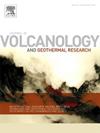Conditions for formation and preservation of andesite-hosted mafic enclaves during the 2018 Lower East Rift Zone eruption of Kīlauea
IF 2.4
3区 地球科学
Q2 GEOSCIENCES, MULTIDISCIPLINARY
Journal of Volcanology and Geothermal Research
Pub Date : 2024-10-09
DOI:10.1016/j.jvolgeores.2024.108205
引用次数: 0
Abstract
Andesites erupted at Kīlauea in 2018 in the Lower East Rift Zone for the first time in the known geological record. The evolved lavas erupted at Fissure 17 of the 2018 eruption, ranging from andesites to basaltic andesites, contain abundant mafic enclaves both in the lava flows and the ejecta, which are unusual at Kīlauea and in Hawai'i in general. Textural observations indicate that the enclaves originate from incomplete mixing of two magmas rather than the incorporation of cold basaltic wall rock. We suggest, on the basis of bulk and mineral compositions, that the source of the mafic enclaves is the early 2018 evolved basalt magma (phase 1b) that erupted concomitantly at adjacent fissures, which mixed with the andesite to produce the range of basaltic andesite compositions observed at Fissure 17. The coexistence of homogenized basaltic andesites and mafic enclaves within the same magma require a mixing mechanism resulting in both complete homogenization and preservation of enclaves. We propose that the range of mixing and mingling processes may be explained by spatial and temporal variability in the mixing percentages of the phase 1b basalt and the andesite within the andesite magma chamber. Field observations, chemical compositions, and 2D thermal conduction models suggest that enclaves are preserved where the basalt contribution to mixing is less than roughly 40 %, as a result of microlite crystallization leading to rigidification of the enclave magma. Above this threshold, the mixed magmas became largely homogenized. The scarcity of mafic enclaves at Kīlauea and in the Hawai'i igneous record is likely explained by mixing between magmas that lack sufficient compositional and rheological contrasts to preserve them.
2018年基劳埃阿东大裂谷带下段喷发期间安山岩托管黑云母飞地的形成和保存条件
2018年,在已知的地质记录中,基劳埃阿下东裂谷区首次喷发了安山岩。2018 年在第 17 号裂口喷发的演化熔岩从安山岩到玄武安山岩不等,在熔岩流和喷出岩中都含有丰富的黑云母飞地,这在基劳埃火山和整个夏威夷都是不常见的。纹理观察表明,这些飞地源于两种岩浆的不完全混合,而不是冷玄武岩壁岩的加入。根据岩体和矿物成分,我们认为黑云母飞地的来源是在相邻裂缝同时喷发的 2018 年早期演化玄武岩岩浆(1b 阶段),它与安山岩混合,产生了在 17 号裂缝观察到的一系列玄武岩安山岩成分。在同一岩浆中,同质化的玄武安山岩和黑云母飞地共存,这需要一种混合机制,既能导致完全同质化,又能保留飞地。我们提出,混合和交融过程的范围可以用安山岩岩浆腔内 1b 相玄武岩和安山岩混合比例的时空变化来解释。实地观测、化学成分和二维热传导模型表明,在玄武岩在混合中所占比例小于大约40%的地方,飞地得以保留,这是微晶岩结晶导致飞地岩浆僵化的结果。超过这一临界值,混合岩浆在很大程度上变得均匀。在基劳埃火山和夏威夷火成岩记录中很少出现黑云母飞地,这可能是因为岩浆之间的混合缺乏足够的成分和流变对比来保存它们。
本文章由计算机程序翻译,如有差异,请以英文原文为准。
求助全文
约1分钟内获得全文
求助全文
来源期刊
CiteScore
5.90
自引率
13.80%
发文量
183
审稿时长
19.7 weeks
期刊介绍:
An international research journal with focus on volcanic and geothermal processes and their impact on the environment and society.
Submission of papers covering the following aspects of volcanology and geothermal research are encouraged:
(1) Geological aspects of volcanic systems: volcano stratigraphy, structure and tectonic influence; eruptive history; evolution of volcanic landforms; eruption style and progress; dispersal patterns of lava and ash; analysis of real-time eruption observations.
(2) Geochemical and petrological aspects of volcanic rocks: magma genesis and evolution; crystallization; volatile compositions, solubility, and degassing; volcanic petrography and textural analysis.
(3) Hydrology, geochemistry and measurement of volcanic and hydrothermal fluids: volcanic gas emissions; fumaroles and springs; crater lakes; hydrothermal mineralization.
(4) Geophysical aspects of volcanic systems: physical properties of volcanic rocks and magmas; heat flow studies; volcano seismology, geodesy and remote sensing.
(5) Computational modeling and experimental simulation of magmatic and hydrothermal processes: eruption dynamics; magma transport and storage; plume dynamics and ash dispersal; lava flow dynamics; hydrothermal fluid flow; thermodynamics of aqueous fluids and melts.
(6) Volcano hazard and risk research: hazard zonation methodology, development of forecasting tools; assessment techniques for vulnerability and impact.

 求助内容:
求助内容: 应助结果提醒方式:
应助结果提醒方式:


